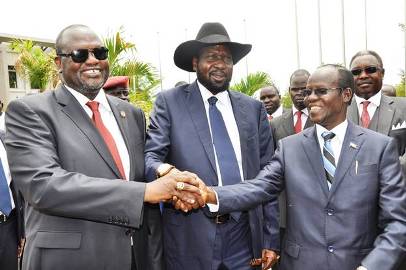SPLM-IO says 48 hours ultimatum to Machar unnecessary
July 22, 2016 (JUBA) – The 48 hours ultimatum declared by President Salva Kiir for the expected return of the First Vice President, Riek Machar, to the national capital, Juba, is unnecessary, said Machar’s spokesperson.

“Dr. Riek Machar is given 48 hours from today [Thursday] to report to work in Juba,” said Ateny, without stating any implication of Machar’s failure to honour the deadline.
President Kiir could replace Machar, should he fail to respond to his call to establish contact with him within 48 hours and returns back.
“The country will not wait indefinitely for Riek,” said president Kiir, according to the statement read over the state owned South Sudan Broadcasting Corporation (SSBC) by the minister in his office, Mayiik Ayii Deng.
The head of state however revealed that he shall consult before taking a decision to replace his deputy, “should his party (SPLM-IO) decide to replace him (Machar) in absentia.”
“I will be expecting a response within 48 hours so that we establish contact and continue building and promoting peace amongst our people now suffering because of this uncalled for conflict,” he said.
It is unclear whether the political structures and leadership of the SPLM-IO have met and held a meeting to discuss the fate of Machar and steps that might be taken should he continue to decline to return.
But Machar’s spokesperson in response said the ultimatum was unnecessary because Machar was willing to return to Juba once the third force is deployed in the capital, Juba, to separate the two forces and provide security to the people and the leaderships.
“There is no reason to give ultimatum while the matter behind the delay is very clear to everybody. The First Vice President, Dr. Riek Machar, has said it time and again that he will soon return to Juba once the third party force already endorsed by IGAD, AU and UN is deployed in the capital to provide security and protection. So the ultimatum is unnecessary because the third force has not yet been deployed in Juba,” James Gatdet Dak, opposition leader’s spokesperson told Sudan Tribune on Friday.
Dak said because “President Kiir is not in control of his forces in Juba even inside and around his palace”, if Machar returns with his forces to Juba without a third force buffer, his forces may be attacked and violence may erupt again.
He said that as soon as the regional forces are on the ground in Juba, Machar will return to the capital.
UNEQUAL RIVAL FORCES
The opposition leader’s official spokesperson also blamed the deployment of unequal number of rival troops and heavy military equipment in the capital, Juba, on the recent clashes in the capital.
“I believe that because we had a small number of troops with light weapons deployed in the capital, Juba, per the security arrangements, this had encouraged President Salva Kiir’s forces to attack the bodyguards of the First Vice President, Dr. Riek Machar, at the palace and again at his Jebel Kujur military base and his residence,” said Dak.
He said according to the security arrangements for Juba which was imposed on the SPLA-IO leadership by the regional mediators of IGAD in August 2015, only 2,910 of combined police and military forces were allowed to deploy in Juba, while President Kiir’s forces are over 20,000 in Juba.
Dak added that out of the agreed 2,910 only 1,300 soldiers arrived and were stationed at Jebel Kujur and about 400 police personnel were taken to Rajaf police academy, south of Juba, for joint training and integration with their colleagues from President Kiir’s faction.
“If the two parties were allowed to have an equal number of forces deployed in Juba, President Kiir’s forces would have not dared to attack the First Vice President. They would have thought of the consequences and this would have served as deterrence,” he said.
He claimed that although President Kiir’s forces lost hundreds of soldiers in the four days of fighting in Juba, they were encouraged by the fact that their number was twenty times more than the number of Machar’s forces in the capital.
“They believe in numbers, not even in quality of fighters. Having more than 20,000 soldiers in Juba against our 1,370 encouraged them to start the fighting,” Dak said.
Dak further claimed that President Kiir’s forces thought they were going to dislodge the SPLA-IO’s small number of troops “within three hours and capture Machar”, but that turned out to be a number of days of fighting with heavy losses on their side.
He called on the Joint Monitoring and Evaluation Commission (JMEC) to facilitate the transportation of the remaining 1,000 opposition troops to Juba as part of the security arrangements.
The spokesperson said forces loyal to President Kiir have been violating the cessation of hostilities declared on 11 July by the two leaders, as fighting had been going on around Mundri and on Juba-Yei road.
He further welcomed the proposed deployment of a third party force as endorsed so that “Juba should be demilitarized and forces withdrawn t 25 km outside the capital.”
He added that once a third force takes charge of security in Juba to protect the citizens and separate the rival forces, the situation would provide an opportunity for the top leaders and their parties to engage in the implementation of the agreement.
Dak accused the forces loyal to President Kiir of continuing to attack their forces around Mundri and on Yei road in hunting down Machar, despite the assurances from the President that he would protect him.
(ST)
